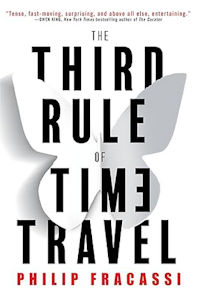The Third Rule of Time Travel by Philip Fracassi: Review by Paul Di Filippo
 The Third Rule of Time Travel, Philip Fracassi (Orbit 978-0316572514, trade paperback, 336pp, $18.99) March 2025
The Third Rule of Time Travel, Philip Fracassi (Orbit 978-0316572514, trade paperback, 336pp, $18.99) March 2025
I will never forget the thrill of encountering Jack London’s novel The Star Rover when I was a teen. This incredibly powerful and vivid tale of a man who can send his consciousness roaming across time and space to live again through distant events was truly thought-expanding. It was mind-opening in its large vistas.
Philip Fracassi has achieved similar frissons in his sixth novel, The Third Rule of Time Travel. But unlike London, he has done so through pure science fiction, rather than wish-fulfilling fantasy. True, he manages to insert some quasi-supernatural scares, but they are all eventually justified as outcomes of the original scientific postulates in action. Moreover, the book plumbs those universal existential depths that much of the best SF plunges into. I was reminded while reading it of a critical volume perhaps too little recalled these days: The World Beyond the Hill, by Alexei and Cory Panshin. The thesis of that study was that beyond all the gadgetry and Widescreen Baroque kicks that we associate with SF, there lies a nigh-religious desire to dig at the foundations of the cosmos, and attain a godlike knowledge. You’ll see that urge explicitly at work in this book.
The year is 2044, and there exists a Faustian billionaire named Jim Langan (a Tuckerism nod to fellow writer John Langan, perhaps?).
To the average passerby, the headquarters of Langan Corporation appears more like a Cold War–era military complex than a cutting-edge tech company with a market value over fifty billion dollars.
Atop a broad hill, reached only by helicopter or via a single winding drive, nestled within a high-fenced perimeter monitored 24/7 by a military-grade security team (the parent company of which regularly competes for wartime mercenary duties), Langan Corp. is a single-story Brutalist-style concrete and glass structure. A square city block of impenetrable intelligence and hidden secrets.
Among the scores of top-secret research projects humming away inside this corporate hive is a time-travel experiment run by Beth Darlow. She and her husband Colson have invented an as-yet unperfected mode of journeying to the past only. However, Colson is now dead, thanks to a stupid random car accident, and a sad, harried and Langan-pressured Beth must carry on alone, with only one assistant, a somewhat devil-may-care fellow named Tariq, to help her.
The uniqueness of Beth’s machine is this. It opens up a tiny wormhole in spacetime, builds a software abstract of the traveler’s entire self, then shoots the packet down the wormhole, heading lord knows where. The only constraint is that the consciousness of Beth from 2044 will intersect the consciousness of Beth herself only, at some other past point on her lifeline.
The trips Beth has taken so far—such as inhabiting the mind of her teenage self at the moment of her parents’ deaths—have been harrowing. What strange attractors are at work in choosing the destinations? Can she perfect the machine in time and with a budget that satisfies Langan? Are future trips going to lead her vacated physical body to flatline? And you think your job is difficult!
Meanwhile, Beth is also trying to be a good single Mom to her daughter Isabella. She is facing hostility from her peers, and also the annoying probes of an investigative journalist, Chiyo Nakada. And Langan seems on the point of firing her. What else could arise to plague her? How about visions of her dead husband appearing at inopportune times?
Fracassi does a fine job of balancing the quotidian elements of Beth’s life and personality (what she feels at missing Isabelle’s first sleepover, for instance, or her grief at Colson’s death) with her concerns as a top-rated scientist struggling to unravel one of the universe’s mysteries. The tensions between the two halves of her life oscillate: one minute one set of troubles is paramount, the next minute the other. But the kicker will prove to be that professional and private affairs eventually merge, and to solve one is to solve the other.
With Beth onstage continuously, she has to be keenly and lovingly drawn, and she is. There is no problem believing in her substantiveness. Other characters exhibit similar if lesser depths: the staff psychologist Jonathan Greer, and Tariq also, who finally shines in a pinch. Even evil overlord Langan shows moments of humanity.
Fracassi’s prose is deliberate, clean and straightforward, able to convey well both abstruse info and moments of suspense. His pacing is a little slow when building up Beth’s everyday humanness, but when that job is finished, everything accelerates. Overall, the book is highly cinematic.
A few other works popped into my mind during my enjoyment of this book: Ballard’s “Manhole 69,” about test subjects deranged by a sleep experiment; several Tiptree stories about minds cast adrift down personal timelines; and Le Guin’s The Lathe of Heaven. Fracassi’s book has earned a place beside those trophies.
Interested in this title? Your purchase through the links below brings us a small amount of affiliate income and helps us keep doing all the reviews you love to read!
 While you are here, please take a moment to support Locus with a one-time or recurring donation. We rely on reader donations to keep the magazine and site going, and would like to keep the site paywall free, but WE NEED YOUR FINANCIAL SUPPORT to continue quality coverage of the science fiction and fantasy field.
While you are here, please take a moment to support Locus with a one-time or recurring donation. We rely on reader donations to keep the magazine and site going, and would like to keep the site paywall free, but WE NEED YOUR FINANCIAL SUPPORT to continue quality coverage of the science fiction and fantasy field.
©Locus Magazine. Copyrighted material may not be republished without permission of LSFF.








